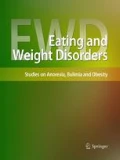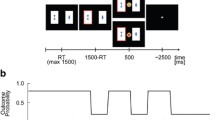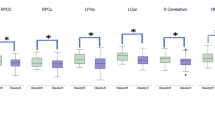Abstract
Introduction
There may be shared neuropsychological dysfunctions in ADHD and obesity. This study tested a neuropsychological model of ADHD (reward/executive dysfunctioning) in individuals with obesity. Furthermore, the association between co-morbid binge eating and reward/executive dysfunction was explored.
Methods
Reward/executive dysfunctioning was assessed using both neuropsychological measures and questionnaires in individuals (aged 17–68) with obesity (N = 39; mean BMI = 39.70) and normal weight (N = 25; mean BMI = 22.94).
Results
No significant differences emerged between individuals with and without obesity on the outcome measures. However, individuals with obesity and binge eating showed significantly more self-reported delay discounting and inattention than those individuals with obesity but without binge eating. When controlling for inattention, this difference in delay discounting was no longer significant.
Discussion
Not obesity alone but obesity with binge eating was specifically associated with a mechanism often reported in ADHD, namely delay discounting. However, this effect may be more driven by inattention.
Similar content being viewed by others
References
Cortese S, Comencini E, Vincenzi B, Speranza M, Angriman M (2013) Attention-deficit/hyperactivity disorder and impairment in executive functions. A barrier to weight loss in individuals with obesity? BMC Psychiatry 13:286. doi:10.1186/1471-244X-13-286
Sonuga-Barke EJS, Halperin JM (2010) Developmental phenotypes and causal pathways in attention deficit/hyperactivity disorder: potential targets for early intervention? J Child Psychol Psychiatry 51:368–398. doi:10.1111/j.1469-7610.2009.02195.x
Coghill D, Seth S, Matthews K (2014) A comprehensive assessment of memory, delay aversion, timing, inhibition, decision making and variability in attention deficit hyperactivity disorder: advancing beyond the three-pathway models. Psychol Med 44:1889–2001. doi:10.1017/S0033291713002547
Sonuga-Barke EJS (2003) The dual pathway model of AD/HD: an elaboration of neuro-developmental characteristics. Neurosci Biobehav Rev 27:593–604. doi:10.1016/j.neubiorev.2003.08.005
Luman M, Oosterlaan J, Sergeant JA (2005) The impact of reinforcement contingencies on ADHD: A review and theoretical appraisal. Clin Psychol Rev 25:183–213. doi:10.1016/j.cpr.2004.11.001
Willcutt EG, Doyle AE, Nigg JT, Faraone SV, Pennington BF (2005) Validity of the executive function theory of attention-deficit/hyperactivity disorder: a meta-analytic review. Biol Psychiatry 57:1336–1346. doi:10.1016/j.biopsych.2005.02.006
Caleza C, Yanez-Vico RM, Mendoza A, Iglesias-Linares A (2016) Childhood obesity and delayed gratification behavior: a systematic review of experimental studies. J Pediatr 169:201–207. doi:10.1016/j.jpeds.2015.10.008
Cortese S, Moreira-Maia CR, St Fleur D, Morcillo-Penalver C, Rohde LA, Faraone SV (2016) Association between ADHD and obesity: a systematic review and meta-analysis. Am J Psychiatry 173:34–43. doi:10.1176/appi.ajp.2015.15020266
Fairburn CG, Wilson (1993) Cognitive treatments for eating disorders. J Consult Clin Psychol 61:261–269
Claes L, Vandereycken W, Vandeputte A, Braet C (2013) Personality prototypes in female pre-bariatric obese patients: do they differ in eating disorder symptoms, psychological complaints, and coping behavior? Eur Eat Disord Rev 21:72–77. doi:10.1002/erv.2188
Davis C, Levitan RD, Smith M, Tweed S, Curtis C (2006) Associations among overeating, overweight, and attention deficit/hyperactivity disorder. A structural equation modelling approach. Eat Behav 7:266–274. doi:10.1016/j.eatbeh.2005.09.006
Voon V (2016) Cognitive biases in binge eating disorder: the hijacking of decision making. CNS Spectr 20, 566–573. doi:10.1017/S1092852915000681
Manwaring JL, Green L, Myerson J, Strube MJ, Wilfley DE (2011) Discounting of various types of rewards by women with and without binge eating disorder. Evidence for general rather than specific differences. Psychol Record 61:561–582
Davis C, Patte K, Curtis C, Reid C (2010) Immediate pleasures and future consequences. A neuropsychological study of binge eating and obesity. Appetite 54:208–213. doi:10.1016/j.appet.2009.11.002
Fairburn CG, Beglin SJ (1994) Assessment of eating disorder psychopathology: interview or self-report questionnaire? Int J Eat Disord 16:363–370
Garner DM (1991) Eating disorder inventory-2: professional manual. Psychological Assessment Resources, Odessa, FL
Carver CS, White TL (1994) Behavioural inhibition, behavioural activation, and affective responses to impending reward and punishment: The BIS/BAS Scales. J Pers Soc Psychol 67:319–333
Bechara A, Damásio AR, Damásio H, Anderson SW (1994) Insensitivity to future consequences following damage to human prefrontal cortex. Cognition 50:7–15
Logan GD, Schachar RJ, Tannock R (1997) Impulsivity and inhibitory control. Psychol Sci 8:60–64
Clare, S., Helps S, Sonuga-Barke EJ (2010) The quick delay questionnaire: a measure of delay aversion and discounting in adults. Atten Deficit Hyperact Disord 2:43–48. doi:10.1007/s12402-010-0020-4
Dovis S, Van der Oord S, Huizenga H, Wiers R, Prins P (2015) Prevalence and diagnostic validity of motivational impairments and deficits in visuospatial short-term memory and working memory in ADHD subtypes. Eur Child Adolesc Psychiatry 24:575–590. doi:10.1007/s00787-014-0612-1
Kooij SJJ, Boonstra MA, Swinkels SH, Bekker EM, de Noord I, Buitelaar JK (2008) Reliability, validity and utility of instruments for self-report and informant report concerning symptoms of ADHD in adult patients. J Atten Disord 11:445–458. doi:10.1177/1087054707299367
De Velasco M, Barduro E, Perez-Templado J, Silveira B, Quintero J (2015) Review of the association between obesity and ADHD. Actas Esp Psiquiatr 43:16–23
Cohen J (1988) Statistical power analysis for the behavioral sciences, 2nd edn. Erlbaum, Hillsdale
Acknowledgements
The authors like to thank An Strauven and Ward Proost of the Obesity Clinic of the General Hospital in Mol and students Eva Van Den Broeck, Charlotte Van Dorst, Fien De Vliegher, and Margaux Gijbels for their help with the data collection and data input.
Author information
Authors and Affiliations
Corresponding author
Ethics declarations
Conflict of interest
Saskia van der Oord has received a consultant fee from Janssen Cilag and has received a speaker honorarium from MEDICE and Shire. Talks and consultancy were all on topics related to non-pharmacological treatments. Caroline Braet declares that she has no conflict of interest. Samuel Cortese declares that he has no conflict of interest. Laurence Claes declares that she has no conflicts of interest.
Ethical approval
All procedures performed in studies involving human participants were in accordance with the ethical standards of the institutional and with the 1964 Helsinki declaration and its later amendments or comparable ethical standards.
Informed consent
Informed consent was obtained from all individual participants included in the study.
Rights and permissions
About this article
Cite this article
Van der Oord, S., Braet, C., Cortese, S. et al. Testing the dual pathway model of ADHD in obesity: a pilot study. Eat Weight Disord 23, 507–512 (2018). https://doi.org/10.1007/s40519-017-0375-z
Received:
Accepted:
Published:
Issue Date:
DOI: https://doi.org/10.1007/s40519-017-0375-z




